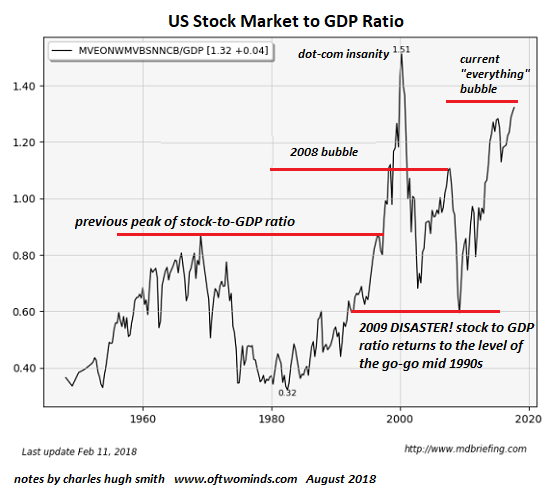As the lying, corruption, and craziness continue unabated in
Washington, it’s a reminder of just how important it is to one’s sanity to
embrace reality. Reality is synonymous with truth, but, as Baltasar
Gracian, the insightful and pragmatic 17thcentury Jesuit priest,
cautioned, “Truth is abhorred by the masses.”
Instead of
loving truth, most people try to make true that which they love, which is a
self-delusive practice that virtually guarantees frustration and failure.
Thus, most people live in an unreal world, a world they create in their own
minds based on the way they would like it to be rather than the way it actually
is. They seem to have adopted the philosophy of Ashleigh Brilliant, who
once remarked, “I have abandoned my search for truth and am now looking for a
good fantasy.”
It is
absolutely essential that a person intellectually and emotionally recognizes
that reality isn’t the way he wishes things to be or the way they appear to be,
but the way they
actually are. The individual who is not able to make this
distinction finds it virtually impossible to make decisions that lead to
positive results.
Which brings me
to principles. A principle is synonymous with a law of nature, as opposed
to a law of man. Most manmade laws are nothing more than legalized
aggression against the sovereignty of peaceful individuals and rarely bear any
relationship to Natural Law, reality, or morality.
A true
principle of nature cannot be created or altered in any way. Consider the
principle of gravity. Isaac Newton didn’t wake up one morning and decide
to create a principle whereby if he dropped an apple from a tree twenty times,
it would fall to the ground nineteen times and rise upward the twentieth time.
Instead,
through experimentation, he found that if you drop an apple from a tree twenty
times, it will fall to the ground twenty times. What he did was discover
the principle, or law, of gravity. A principle, then, is the essence of
reality.
To try to
create our own reality is both futile and destructive. You certainly have
the right to go on believing whatever you want to believe, but reality doesn’t
care about your wants or beliefs. Reality will deliver negative
consequences to the well-meaning, ignorant individual as surely as it will to
the most malevolent, stubborn person. Not once has reality excused anyone
for good motives, so consistency is essential when it comes to an accurate
perception of reality.
In physics, we
learn that for every action there is an equal and opposite reaction. The
longer I live, however, the more convinced I am that in the daily process of
living (as opposed to the science of physics), reactions tend to be far greater than the
actions that provoke them.
In other words,
whenever we make a decision or take an action that we know, in our heart of
hearts, is wrong, the punishment seems to be way out of proportion to the
“crime.” My experience has been that I almost always end up paying for an
irresponsible action multiple times, with each payment seeming to take the form
of a balloon note carrying onerous, compounded interest.
The consequence
may take a long time, and it may be indirect or subtle in nature, but
there is always
a consequence. Symbolically speaking, everything you do goes into your
book of life. This doesn’t necessarily hold a religious connotation, but
I do firmly believe that universal forces are at work that pull us inexorably
toward the deserving results of our actions. Kindness begets kindness;
cruelty begets cruelty.
Where many
people allow themselves to be misled is that the payback for their actions is
not always immediate, which results in their failing to make the connection
when it finally arrives. And even when the consequence is immediate, they
may miss the subtlety of the connection between the result and the action that
caused it.
Though most
people know, deep down inside, that all actions have consequences, I am
convinced that very few of them give it more than a passing thought as they go
about their daily affairs. The question is, why would people ignore such
an all-powerful, immutable principle?
I believe it’s
because man inhabits a world of delusions, which obscures reality and creates
dangers for himself and others. He rarely understands what he is doing or
why he is doing it. His actions and beliefs indicate that he lives in a
state of waking dreams.
I further
believe that one of the most important steps in a person’s personal growth is
to become adept at transcending his world of delusions. This is not an
easy task, due in no small part to the fact that we are surrounded by delusions
each and every day.
The nice thing
about it, however, is that you can overcome these delusions, provided you are
committed to truth. This means being willing to subordinate your desires
and wishes — your dreams, as it were — to reality.
This is not to
say that you should not have dreams. On the contrary, dreams can be
healthy for the psyche. What it does mean, however, is that you should
not allow your dreams and desires to override reality. Put simply, your
love of truth must be greater than your desire to make your dreams come true.
The more often,
and more quickly, you are able to recognize truth in your daily life, the more
likely it is that you will become part of that small minority of the human race
that lives in the real world rather than inhabiting a state of waking dreams.
The challenge
is to learn to correctly perceive reality, because when you accurately and
consistently perceive reality, delusions begin to disappear. And as
delusions vanish from your life, you are able to deal with problems on a more
rational basis, which in turn leads to success in all areas of your life.



